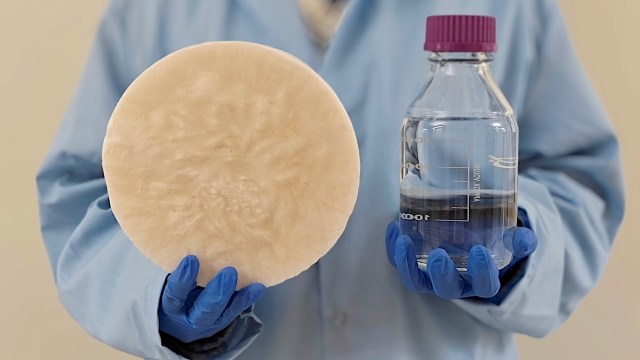Scientists unveil unexpected way to transform waste into clean drinking water: 'Opens up an entirely new way to think'

Researchers at the University of Texas, Austin, recently designed a new system by which to extract drinkable water out of a variety of natural ingredients, according to their article posted to Futurity .
From food waste to seashells, this "molecularly functionalized biomass hydrogel" system may help ensure our water supply against drier weather conditions by making use of materials we often overlook.
According to the university, the researchers aimed for sustainability and scalability by applying our already-plentiful biomass , or organic matter, as a biodegradable source of drinking water. Conventional water harvesting methods, by contrast, rely on "specific materials for specific functions" and require petrochemicals and considerable energy consumption.
The chemicals and fuel involved in water treatment plants, for instance, release Earth-warming gases that contribute significantly to our planet's overheating , noted one review from the Energy Reports journal.
"The proposed molecular engineering methodology … expands the range of raw materials by leveraging abundant biomass feedstock," explained the study, published in the Advanced Materials journal.
The researchers, led by doctoral student Weizin Guan, developed a two-step process that could turn biomass-based polysaccharides — such as cellulose, chitosan, and starch, all found copiously in agricultural residue and food waste — into sorbents that are able to absorb and retain water and adapt to thermal fluctuations.
Watch now: Giant snails invading New York City?
The UT Austin report indicated that the new system enabled the team to harvest almost 4 gallons of clean water per kilogram of sorbent each day.
By repurposing existing biomass and biomass-based waste for an energy-efficient water extraction process, we can cut down on landfill buildup and carbon pollution — all while securing our water supply as our global temperatures continue to climb. A December United Nations inquiry established that our planet is only growing drier. And according to the BBC, the percentage of the world experiencing drought has tripled since the 1980s.
Materials science and mechanical engineering professor Guihua Yu at UT Austin expressed that the team's recent breakthrough "opens up an entirely new way to think about sustainable water collection."
Going forward, the researchers are working on scaling up their discoveries into real-world applications. As food and agricultural waste make up almost a quarter of municipal solid waste, per the Food and Drug Administration, a large-scale implementation of the team's findings could do wonders in cleaning up our landfills and carving out a sustainable path for resource management in the near future.
| Do you feel safe drinking the tap water where you live? Always Most of the time Not usually Never Click your choice to see results and speak your mind. |
"Since this hydrogel can be fabricated from widely available biomass and operates with minimal energy input, it has strong potential for large-scale production and deployment in off-grid communities, emergency relief efforts, and decentralized water systems," one graduate researcher commented .

Join our free newsletter for weekly updates on the latest innovations improving our lives and shaping our future , and don't miss this cool list of easy ways to help yourself while helping the planet.
Scientists unveil unexpected way to transform waste into clean drinking water: 'Opens up an entirely new way to think' first appeared on The Cool Down .

Post a Comment for "Scientists unveil unexpected way to transform waste into clean drinking water: 'Opens up an entirely new way to think'"